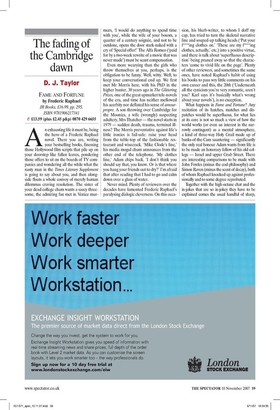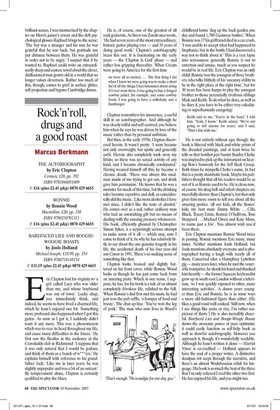The fading of the Cambridge dawn
D. J. Taylor FAME AND FORTUNE by Frederic Raphael JR Books, £16.99, pp. 295, ISBN 9781906217341 £13.59 (plus £2.45 p&p) 0870 429 6655 An exhausting life it must be, being the hero of a Frederic Raphael novel. There you are, writing your bestselling books, finessing those Hollywood film scripts that pile up on your doorstep like fallen leaves, pondering those offers to sit on the boards of TV companies and wondering all the while what the nasty man in the Times Literary Supplement is going to say about you, and then alongside floats a whole convoy of merely human dilemmas craving resolution. The sister of your dead college chum wants a saucy threesome, the admiring fan met in Venice murmurs, 'I would do anything to spend time with you', while the wife of your bosom, a quarter of a century soignee, and not to be outdone, opens the door stark-naked with a cry of 'Special offer!' The Alfa Romeo (paid for by a two-week rewrite of a movie that was never made') must be scant compensation.
Even more wearying than the girls who throw themselves at you, perhaps, is the obligation to be funny. Well, witty. Well, to keep your conversational end up. We first met Mr Morris here, with his PhD in the higher banter, 30 years ago in The Glittering Prizes, one of the great upmarket tele-novels of the era, and time has neither mellowed his acerbity nor deflated his sense of amourpropre. A son throwing over Cambridge for the Moonies, a wife (wrongly) suspecting adultery, Mrs Thatcher — the novel starts in 1979 — sudden death, trauma, terminal illness? The Morris preventative against life's little ironies is fail-safe: raise your head from the table-top of the fashionable restaurant and wisecrack. 'Mike Clode's line,' his media mogul chum announces from the other end of the telephone. 'My clothes line,' Adam chips back. 'I don't think you should say that, you know. Or is that where you hang your friends out to dry?' I'm afraid that after reading that I had to go and calm down over a glass of water.
Never mind. Plenty of reviewers over the decades have lamented Frederic Raphael's paralysing dialogic cleverness. On this occasion, his blurb-writer, to whom I doff my cap, has tried to turn the skeletal narrative line and souped-up talking heads (Put your f***ing clothes on.' These are my f***ing clothes, actually,' etc.) into a positive virtue, and there is talk about 'superfluous description' being pruned away so that the characters 'come to vivid life on the page'. Plenty of other reviewers, and sometimes the same ones, have noted Raphael's habit of using his books to pass wry little comments on his own career and this, the 20th (Underneath all the cynicism you're very romantic, aren't you? Karl says it's basically what's wrong about your novels'), is no exception.
What happens in Fame and Fortune? Any recitation of its hatches, matches and dispatches would be superfluous, for what lies at its core is not so much a view of how the world works (or even an interest in the narrowly contingent) as a mental atmosphere, a kind of three-way Holy Grail made up of banks-of-the-Cam sauntering — significantly the only real honour Adam wants from life is to be made an honorary fellow of his old college — Israel and upper Grub Street. There are interesting comparisons to be made with John Fowles (minus the cod-philosophy) and Simon Raven (minus the scent of decay), both of whom Raphael knocked up against professionally and to some degree reprobated.
Together with the high-octane chat and the in-jokes that are so in-jokey they have to be explained comes the usual handful of sharp, brilliant scenes. I was mesmerised by the chapter on Morris junior's return and the deft psychological glosses Raphael brings to the scene: 'The boy was a stranger and his son; he was grateful that he was back, but gratitude too put distance between them. He was grateful in order not to be angry.' I suspect that if he wanted to, Raphael could write an extraordinarily sharp and austere novel about the clever, disillusioned man grown old in a world that no longer values cleverness. Rather too much of this, though, comes to grief in surface glitter, self-projection and bygone Cambridge dawns.






































































 Previous page
Previous page